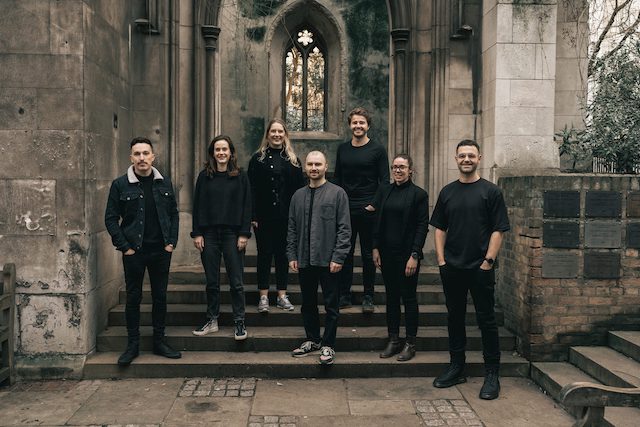SANSARA, The Waiting Sky: A Christmas Meditation, Kings Place review - a thrillingly mysterious and profound Christmas alternative | reviews, news & interviews
SANSARA, The Waiting Sky: A Christmas Meditation, Kings Place review - a thrillingly mysterious and profound Christmas alternative
SANSARA, The Waiting Sky: A Christmas Meditation, Kings Place review - a thrillingly mysterious and profound Christmas alternative
Stunningly interpreted choral music from the 16th century to the modern day

What a beautiful, alternative evening of Christmas music this was, ranging in tone from bleakness to transcendence – a thrilling escape from the season’s cloying commercialism to a sense of something both mysterious and profound.
Last year the SANSARA vocal collective won universal plaudits for their album The Waiting Sky, which traces the journey from Advent to Epiphany in all its anticipation and ecstasy. (Apart, that is, from a lone American review on Amazon, which under the title “Not joyful or merry”, made it clear it was expecting something a bit more twinkly.) Much of the concert took its cue from that album, skilfully combining music from the Renaissance, the 20th and 21st centuries. One moment you were immersed in the haunting Greek Orthodox-inspired spirituality of John Tavener, another in the rich polyphony of William Byrd.
The unaccompanied ensemble started with Tavener’s 1990 O, do not move, which acted almost like a palate cleanser from the noise and bustle of the outside world as it urged us to be still and “listen to the gentle beginning”. The resonant opening combined sustained chords with slowly descending passages that ushered in a mood of meditative solemnity. Then we moved almost seamlessly into Peter Maxwell-Davies’ The Fader of Heaven, which began with the sopranos and altos gently picking out dissonances which hung like bright splashes of pigment in oil. For the end of this first section, a beautifully articulated version of William Byrd’s Vigilate brought full punch to the polyphony. In the final passage “omnibus dico: Vigilate” “I say to all: Watch,” the echoes and reverberations of the voices rang as if in a metallic bowl.
 The second section focused on the Virgin Mary and began with Thomas Tallis’s Videte miraculum. Initially there was a sense of stateliness and quietly felt ecstasy, then the soprano voices took off on thrilling trajectories that evoked the soaring spires of medieval churches. This nicely set the tone for Cecilia McDowall’s ravishing O Oriens (“Oh Morning Star, splendour of light eternal/and sun of righteousness”), filled with heavenly harmonic clashes and dissonances that seemed to make the air shimmer. Judith Weir’s Ave Regina Caelorum (Hail, Queen of the Skies) introduced a more playful tone as the choir skipped nimbly over the syllables. Then Tavener’s Mother of God returned us to a state of clear-eyed solemnity in which the basses in particular seemed to enjoy the resonance and texture of the harmonic progressions.
The second section focused on the Virgin Mary and began with Thomas Tallis’s Videte miraculum. Initially there was a sense of stateliness and quietly felt ecstasy, then the soprano voices took off on thrilling trajectories that evoked the soaring spires of medieval churches. This nicely set the tone for Cecilia McDowall’s ravishing O Oriens (“Oh Morning Star, splendour of light eternal/and sun of righteousness”), filled with heavenly harmonic clashes and dissonances that seemed to make the air shimmer. Judith Weir’s Ave Regina Caelorum (Hail, Queen of the Skies) introduced a more playful tone as the choir skipped nimbly over the syllables. Then Tavener’s Mother of God returned us to a state of clear-eyed solemnity in which the basses in particular seemed to enjoy the resonance and texture of the harmonic progressions.
 The final section of the first half was marked by a towering performance from guest soprano Inna Husieva, (pictured left) who comes from Donetsk, the part of Ukraine swept up in Putin’s 1914 invasion. Husieva lost her home and parents four years ago and has ever since dedicated her work to raising awareness of her people’s plight. She arrived on stage dressed in the blues and yellows of the Ukrainian flag, and began with a work by Ukrainian composer Valentin Silvestrov, Sleep, Jesus. The choir provided an accompaniment that was simultaneously silvery and subtly textured as Husieva’s gorgeous mellifluous voice warned the Messiah to sleep while he could before the terrors that awaited him.
The final section of the first half was marked by a towering performance from guest soprano Inna Husieva, (pictured left) who comes from Donetsk, the part of Ukraine swept up in Putin’s 1914 invasion. Husieva lost her home and parents four years ago and has ever since dedicated her work to raising awareness of her people’s plight. She arrived on stage dressed in the blues and yellows of the Ukrainian flag, and began with a work by Ukrainian composer Valentin Silvestrov, Sleep, Jesus. The choir provided an accompaniment that was simultaneously silvery and subtly textured as Husieva’s gorgeous mellifluous voice warned the Messiah to sleep while he could before the terrors that awaited him.
This was followed by the Ukrainian Tetiana Yashvili’s vibrant folk-inspired O Heavenly King, and then Natalia Tsupryk’s A Quiet Night – Tyhoyi Nochi, specially commissioned by SANSARA for Ukrainian Independence Day on August 24 2022. It’s based on a text chosen by SANSARA’S artistic director by the Ukrainian poet Serhiy Zhadan, “It is us who sing in the quiet of the night/when the inner town is silent/burying the seeds of our sighs/in the breadth of black earth”. Normally a larger choir performs this – so Herring improvised by asking the audience to hum a sustained “E” as the singers on stage let the piercing harmonies unfurl. It was an incredible moment to be part of a piece of music as tragic as it was poignant; the impact of the music was indivisible from the images of ravaged cities and human destruction that continue to stalk our foreign pages.
After the interval Oliver Tarney’s The Waiting Sky – set to a poem by Lucia Quinault – evoked the stillness and anticipation of a simple country scene before the magic of Christmas descends. Then Adrian Peacock’s Venite Gaudete created a colourful, textured interlude as the different voices chased each other through the playful patter of the words “Veni veni, veni Emmanuel”. While the technique was comparable to that of the Judith Weir, here it felt more satisfyingly complex. To calm things down again, John Tavener’s setting of William Blake’s The Lamb brought out all the plangent innocence and beguiling mystery of the poet’s vision.
In an evening full of highlights, Inna Husieva then returned to the stage for a section that started with the Swedish composer Fredrik Sixten’s Heavenly King. Here once more we got a sense of the rich layers of her voice, as she combined passion with an almost beatific calm. A transcendent velvety version of Silent Night, rearranged by Silvestrov, was then followed by Sixten’s own exquisitely dissonant reworking, Mary’s Lullaby.
For the final section Rhiannon Randle’s iridescent O Magnum Mysterium – which glimmered like a mirage in the desert – was succeeded by Reginald Jacques’ Away in a Manger, where the saccharine sentiments were upgraded by satisfyingly sombre harmonies (and enhanced by SANSARA’s own addition of a canon section). After spiriting us through Philip Lawson’s Lullay my liking and Eric Whitacre’s Lux aurumque the ensemble then sent us out into the streets with a suitably tart and witty version of Have Yourself a Merry Little Christmas. It was a stunning evening, filled with deft skill and thought-provoking innovation. A far greater boost to this reviewer’s seasonal excitement than any of the more twinkly offerings.
rating
Explore topics
Share this article
The future of Arts Journalism
You can stop theartsdesk.com closing!
We urgently need financing to survive. Our fundraising drive has thus far raised £49,000 but we need to reach £100,000 or we will be forced to close. Please contribute here: https://gofund.me/c3f6033d
And if you can forward this information to anyone who might assist, we’d be grateful.

Subscribe to theartsdesk.com
Thank you for continuing to read our work on theartsdesk.com. For unlimited access to every article in its entirety, including our archive of more than 15,000 pieces, we're asking for £5 per month or £40 per year. We feel it's a very good deal, and hope you do too.
To take a subscription now simply click here.
And if you're looking for that extra gift for a friend or family member, why not treat them to a theartsdesk.com gift subscription?
more Classical music
 theartsdesk at the Three Choirs Festival - Passion in the Cathedral
Cantatas new and old, slate quarries to Calvary
theartsdesk at the Three Choirs Festival - Passion in the Cathedral
Cantatas new and old, slate quarries to Calvary
 BBC Proms: Estonian Philharmonic Chamber Choir, Kaljuste review - Arvo Pärt 90th birthday tribute
Stillness and contemplation characterise this well sung late-nighter
BBC Proms: Estonian Philharmonic Chamber Choir, Kaljuste review - Arvo Pärt 90th birthday tribute
Stillness and contemplation characterise this well sung late-nighter
 BBC Proms: Kholodenko, BBCNOW, Otaka review - exhilarating Lutosławski, underwhelming Rachmaninov
Polish composers to the fore in veteran conductor’s farewell
BBC Proms: Kholodenko, BBCNOW, Otaka review - exhilarating Lutosławski, underwhelming Rachmaninov
Polish composers to the fore in veteran conductor’s farewell
 theartsdesk at the Pärnu Music Festival 2025 - Arvo Pärt at 90 flanked by lightness and warmth
Paavo Järvi’s Estonian Festival Orchestra still casts its familiar spell
theartsdesk at the Pärnu Music Festival 2025 - Arvo Pärt at 90 flanked by lightness and warmth
Paavo Järvi’s Estonian Festival Orchestra still casts its familiar spell
 BBC Proms: Batsashvili, BBC Scottish Symphony Orchestra, Ryan Wigglesworth review - grief and glory
Subdued Mozart yields to blazing Bruckner
BBC Proms: Batsashvili, BBC Scottish Symphony Orchestra, Ryan Wigglesworth review - grief and glory
Subdued Mozart yields to blazing Bruckner
 Classical CDs: Hens, Hamburg and handmaids
An unsung French conductor boxed up, plus Argentinian string quartets and baroque keyboard music
Classical CDs: Hens, Hamburg and handmaids
An unsung French conductor boxed up, plus Argentinian string quartets and baroque keyboard music
 BBC Proms: McCarthy, Bournemouth SO, Wigglesworth review - spring-heeled variety
A Ravel concerto and a Walton symphony with depth but huge entertainment value
BBC Proms: McCarthy, Bournemouth SO, Wigglesworth review - spring-heeled variety
A Ravel concerto and a Walton symphony with depth but huge entertainment value
 BBC Proms: First Night, Batiashvili, BBCSO, Oramo review - glorious Vaughan Williams
Spirited festival opener is crowned with little-heard choral epic
BBC Proms: First Night, Batiashvili, BBCSO, Oramo review - glorious Vaughan Williams
Spirited festival opener is crowned with little-heard choral epic
 Interview: Quinteto Astor Piazzolla on playing in London and why Mick Jagger's a fan
Music Director Julián Vat and pianist Matias Feigin compare notes on Piazzolla
Interview: Quinteto Astor Piazzolla on playing in London and why Mick Jagger's a fan
Music Director Julián Vat and pianist Matias Feigin compare notes on Piazzolla
 Classical CDs: Bells, birdsong and braggadocio
British contemporary music, percussive piano concertos and a talented baritone sings Mozart
Classical CDs: Bells, birdsong and braggadocio
British contemporary music, percussive piano concertos and a talented baritone sings Mozart
 Siglo de Oro, Wigmore Hall review - electronic Lamentations and Trojan tragedy
Committed and intense performance of a newly-commissioned oratorio
Siglo de Oro, Wigmore Hall review - electronic Lamentations and Trojan tragedy
Committed and intense performance of a newly-commissioned oratorio

Add comment